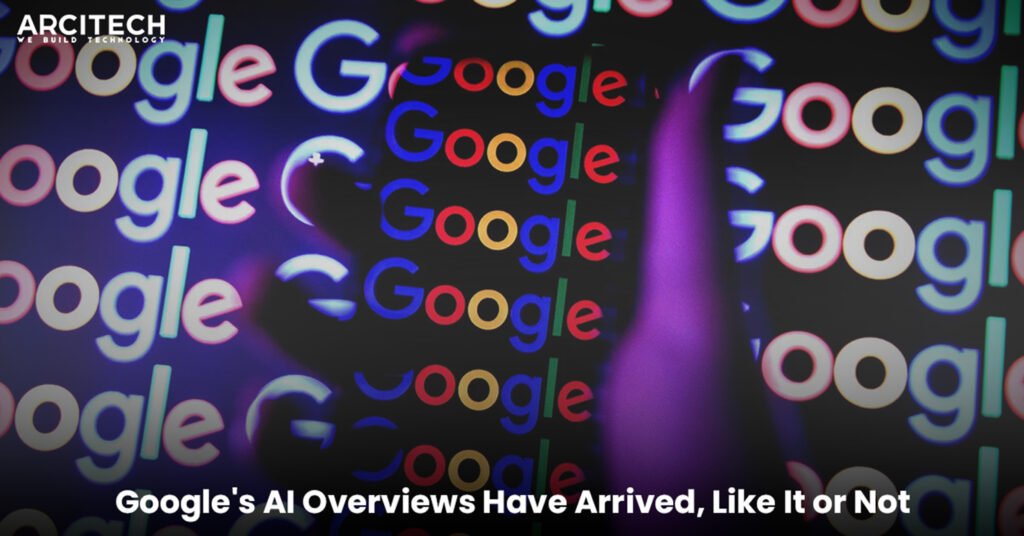Google’s new Gemini-powered search experience is now available to users in the US. This advanced AI-driven feature enhances search results with comprehensive overviews. Here’s some guidance on how to navigate the new interface. However, note that turning off the AI Overviews option is not currently possible.
When you search on Google to learn about the new AI Overview feature, your query might trigger an AI Overview—though not every query will. If it does, you’ll see an AI-generated summary at the top of your search results. These AI Overviews provide users with synthesized answers to queries, derived from various web sources, without requiring clicks on links or revealing the names of the publications used.
Previously, Google introduced a preliminary version of AI Overviews within the Search Generative Experience, available only to users who opted in. However, during the recent I/O developer conference, Google announced the broader rollout of AI Overviews. Now, all users in the US will see these summaries at the top of their search results, provided their queries can be answered with a summary. This expansion aims to enhance the search experience by delivering immediate, concise answers directly within the search results.
If you prefer to see traditional web links rather than AI Overviews, be aware that these AI summaries are now integrated into the default search results page and cannot be turned off. While you can’t completely disable AI Overviews for your Google account, you can manually adjust your view to display only web links for each search query.

Here’s how to do it
- Perform your search as usual on Google.
- If an AI Overview appears at the top of your search results, look for the More tab among the filter options like Images, Videos, and Shopping.
- Click on the More tab and then select Web from the drop-down menu.
This action will refresh the page to show only traditional search results with links to actual websites, bypassing the AI Overview for that specific query. Unfortunately, this must be done for each individual search to avoid AI-generated summaries.
When can you expect your query to trigger an AI-generated summary? According to Mallory De Leon, a Google spokesperson, “AI overviews appear for complex queries. You’ll find AI Overviews in your Google Search results when our systems determine that generative AI can be especially helpful—for example, when you want to quickly understand information from a range of sources.” However, during initial tests, these summaries appeared inconsistently, showing up for both simple questions and more complex queries.
The AI Overview feature is powered by a customized version of Google’s Gemini model, enhanced with elements from the company’s search system, such as the Knowledge Graph, which contains billions of general facts. This combination allows AI overviews to provide comprehensive and helpful summaries derived from diverse sources, aiming to enhance the search experience by offering immediate, synthesized information directly within the search results.
One of the primary concerns about the rollout of Google’s AI Overview feature is the potential for AI-generated inaccuracies, commonly referred to as “hallucinations.” When using Google’s Gemini chatbot, a disclaimer warns that “Gemini may display inaccurate info, including about people, so double-check its responses.” However, the AI Overview feature only includes a brief note stating, “Generative AI is experimental,” without explicitly warning about possible inaccuracies.
When questioned about the lack of a detailed disclaimer for AI Overviews, Mallory De Leon, a Google spokesperson, emphasized the company’s commitment to maintaining high-quality search results. She noted that Google conducted adversarial red-teaming tests to identify and mitigate potential weaknesses in the feature. “This implementation of generative AI is rooted in Search’s core quality and safety systems, with built-in guardrails to prevent low-quality or harmful information from surfacing,” De Leon said. “AI Overviews are designed to highlight information that can be easily verified by the supporting information that we surface.”
Despite these assurances, users are still advised to click through to the original webpage links to verify the accuracy of the information. However, it’s likely that many users, seeking quick answers, may not take the extra step to review the source material for Google’s AI-generated responses.
Liz Reid, Google’s head of search, recently informed his colleague Lauren Goode that AI Overviews are expected to be available in countries outside of the United States by the end of 2024. This means that over a billion people could soon encounter this new feature. Concerns remain among publishers about the potential impact on readership, as well as among users about the reliability of AI-generated content. While AI Overviews are designed to save time, there is a risk they could lead to less trustworthy search results.
In summary, while Google has taken steps to ensure the quality and safety of its AI overviews, the feature’s potential to produce inaccurate information remains a significant concern. Users are encouraged to verify the information provided by AI Overviews to ensure its accuracy.
For the latest AI updates and expert solutions in website design, digital marketing, software development, mobile app development, and UI/UX design, visit Arcitech.ai. Our team at Arcitech.ai is dedicated to providing you with exceptional solutions tailored to meet your unique needs. Stay ahead of the curve—follow Arcitech.ai today.


